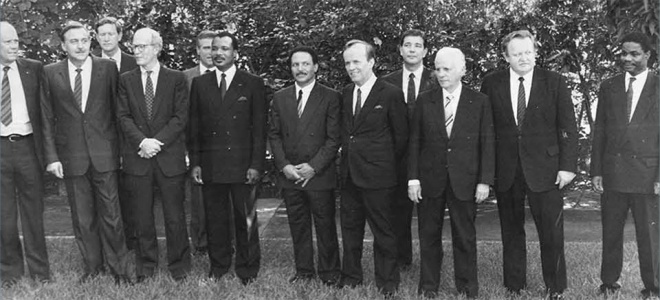Difference between revisions of "Denis Sassou Nguesso"
(t) |
m (Text replacement - "1970s " to "1970s ") |
||
| (2 intermediate revisions by one other user not shown) | |||
| Line 2: | Line 2: | ||
|wikipedia=https://en.wikipedia.org/wiki/Denis_Sassou_Nguesso | |wikipedia=https://en.wikipedia.org/wiki/Denis_Sassou_Nguesso | ||
|constitutes=politician | |constitutes=politician | ||
| + | |spouses=Antoinette Sassou Nguesso | ||
| + | |birth_date=1943 | ||
| + | |birth_place=Edou, French Equatorial Africa | ||
| + | |religion=Roman Catholicism | ||
| + | |political_parties=Congolese Party of Labour | ||
| + | |employment={{job | ||
| + | |title=President of the Republic of Congo | ||
| + | |start=25 October 1997 | ||
| + | |end=31 August 1992 | ||
| + | }}{{job | ||
| + | |title=President of the Republic of Congo | ||
| + | |start=8 February 1979 | ||
| + | |end=31 August 1992 | ||
| + | }} | ||
}} | }} | ||
| Line 7: | Line 21: | ||
==Background== | ==Background== | ||
| − | Born in 1943 in Edou, Oyo district, Sassou Nguesso joined the army in 1960 and by the early 1970s had risen to the rank of Colonel. During this time he began to play an active role in politics. He joined the Congolese Labour Party which became the country’s ruling party in 1970. Sassou Nguesso was the protégé of President Marien Ngouabi, who appointed him Minister of Defence in 1975. | + | Born in 1943 in Edou, Oyo district, Sassou Nguesso joined the army in 1960 and by the early [[1970s]] had risen to the rank of Colonel. During this time he began to play an active role in politics. He joined the Congolese Labour Party which became the country’s ruling party in 1970. Sassou Nguesso was the protégé of President Marien Ngouabi, who appointed him Minister of Defence in 1975. |
In 1977, Sassou Nguesso was appointed as First Vice President of the Congolese Labour Party’s military committee. In 1979, he was appointed President of the Republic and head of the party. | In 1977, Sassou Nguesso was appointed as First Vice President of the Congolese Labour Party’s military committee. In 1979, he was appointed President of the Republic and head of the party. | ||
Latest revision as of 05:12, 16 September 2016
(politician) | |
|---|---|
| Born | 1943 Edou, French Equatorial Africa |
| Religion | Roman Catholicism |
| Spouse | Antoinette Sassou Nguesso |
| Party | Congolese Party of Labour |
Congolese President Denis Sassou Nguesso is one of Africa’s longest-serving leaders, having been an active public servant for more than three decades. He played a crucial role in the December 1988 Brazzaville Protocol which helped to bring peace to Southern Africa.
Background
Born in 1943 in Edou, Oyo district, Sassou Nguesso joined the army in 1960 and by the early 1970s had risen to the rank of Colonel. During this time he began to play an active role in politics. He joined the Congolese Labour Party which became the country’s ruling party in 1970. Sassou Nguesso was the protégé of President Marien Ngouabi, who appointed him Minister of Defence in 1975.
In 1977, Sassou Nguesso was appointed as First Vice President of the Congolese Labour Party’s military committee. In 1979, he was appointed President of the Republic and head of the party.
Brazzaville Protocol

In 1988, Sassou Nguesso headed the Brazzaville Protocol which dealt with the retreat of Cuban troops from Angola, eventually bringing an end a civil war that had raged for two decades. On 22 December 1988, his protocol was incorporated into the New York Accords which were signed at UN headquarters by representatives of Angola, Cuba and apartheid South Africa, leading to independence of Namibia in March 1990.
Civil War
Sassou Nguesso lost his position in the country’s first multi-party elections in 1992, but returned to power in 1997 after a brief but bloody civil war. Although a cease-fire was declared in 1999, Sassou Nguesso was faced with ongoing violence in some regions of the country, as well as continued economic problems and allegations of corruption within the government. In response, he implemented a series of economic and political reforms to rebuild the country from bankruptcy and strengthen the democratic process. These reforms included a new constitution which was approved by the people of the Republic of the Congo in a national referendum in January 2002. Democratic elections were held in March 2002 and Sassou Nguesso was reelected for a seven-year term as President of the Republic of the Congo.
In addition to his work within Congo, Sassou Nguesso chaired the Organisation of African Unity in 1986 and has since played a prominent role in Africa’s international affairs. During his tenure as the President of the Organisation of African Unity in the late 1980s, he chaired the negotiations that helped put an end to the apartheid regime's illegal occupation of Namibia. Since 2006, he has chaired the African Union and has helped lead the organisation’s efforts to stop the violence in Darfur, Sudan. He also worked to normalise relations between Chad and Sudan and urged for a rapid solution to the crisis in Côte d’Ivoire.
Sassou Nguesso has been a strong voice for development of Africa, encouraging the African Union and other regional bodies to improve access to education, preserve the environment, combat HIV/AIDS and to improve transportation and trade links between African states. He has also been a key actor in peace talks with the Central African Republic.
It was his speech at the Brazzaville Protocol’s 25th anniversary celebrations in February 2014 that laid the foundations for the Brazzaville Foundation and he is its Guiding Founder.[2]